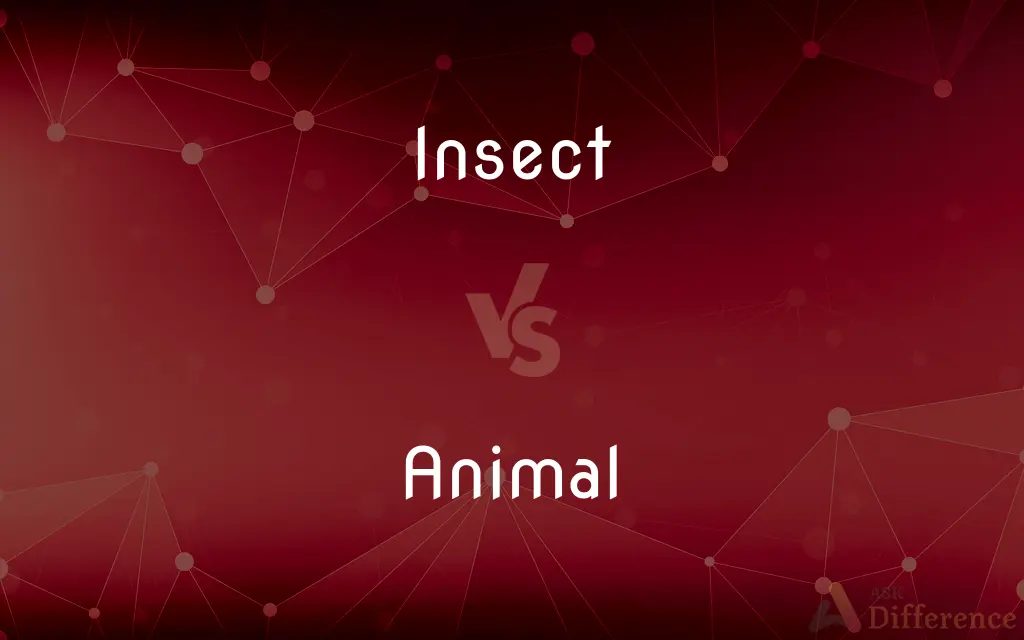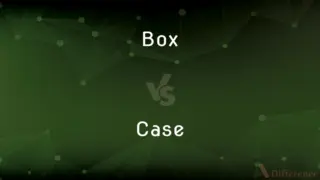Insect vs. Animal — What's the Difference?
An "Insect" is a small arthropod with a specific body structure, while an "Animal" is a broad category of multicellular organisms that are capable of movement and sensation.

Difference Between Insect and Animal
Table of Contents
ADVERTISEMENT
Key Differences
"Insect" refers to a particular class of creatures within the animal kingdom, characterized by features like a three-part body, three pairs of jointed legs, compound eyes, and one pair of antennae. On the other hand, "Animal" encompasses a much larger group, consisting of all multicellular organisms that move, breathe, reproduce, and react to their environment, which includes mammals, birds, reptiles, amphibians, fish, and many others, including insects.
"Insects", being animals themselves, form a subset of the animal kingdom. Their uniqueness lies in their distinct body structure and life cycles, which include stages like larva and pupa. In contrast, "Animals" can have a myriad of life cycles and physical structures, from the metamorphosis of amphibians to the simple birth and growth of mammals.
The world of "Insects" is vast, with millions of identified species, each adapted to its niche in the ecosystem, from pollinators to decomposers. "Animals" in the broader sense, however, shape our planet in even more diverse ways, from the migration of birds affecting plant life to apex predators maintaining the balance of ecosystems.
When we talk about preserving "Insects", we often refer to maintaining the balance of specific ecosystems, as they play critical roles in pollination, decomposition, and being a food source. When discussing "Animal" conservation, the conversation can span from individual species to entire ecosystems, given the extensive diversity and roles they play in nature.
Comparison Chart
Definition
A small arthropod with specific body structure.
Multicellular organism capable of movement and sensation.
ADVERTISEMENT
Taxonomic Rank
A class within the animal kingdom.
A kingdom in taxonomy.
Body Structure
Three-part body, compound eyes, antennae.
Varies widely (can be vertebrates, invertebrates, etc.)
Examples
Butterflies, bees, ants.
Dogs, birds, fish, insects, reptiles.
Ecological Role
Pollination, decomposition, food source for other animals.
Vary widely from apex predators to primary consumers.
Compare with Definitions
Insect
A member of the class Insecta, which undergoes metamorphosis during its life cycle.
The caterpillar is an insect that will transform into a butterfly.
Animal
A multicellular organism that can move voluntarily and sense its environment.
The dog is a loyal animal and great companion.
Insect
Creatures with an exoskeleton, a segmented body, and jointed limbs.
The ant is an insect known for its collective behavior and strength.
Animal
Any member of the kingdom Animalia distinct from plants, fungi, and bacteria.
Whales are the largest animals on Earth.
Insect
Small arthropods typically with a three-part body, compound eyes, and antennae.
The butterfly is a colorful insect that pollinates flowers.
Animal
Entities often studied in the field of zoology.
He devoted his life to the study and conservation of wild animals.
Insect
Organisms often studied in entomology.
She pursued a career studying the diverse world of insects.
Animal
Beings that consume organic material, typically by eating plants or other animals.
The lion, a carnivorous animal, hunts for its prey.
Insect
Animals that typically have wings, though not all fly.
The beetle is an insect with hardened forewings.
Animal
A living organism that feeds on organic matter, typically having specialized sense organs and nervous system and able to respond rapidly to stimuli
Wild animals adapt badly to a caged life
Humans are the only animals who weep
Insect
Insects or Insecta (from Latin insectum) are pancrustacean hexapod invertebrates and the largest group within the arthropod phylum. Insects have a chitinous exoskeleton, a three-part body (head, thorax and abdomen), three pairs of jointed legs, compound eyes and one pair of antennae.
Animal
Relating to or characteristic of animals
Animal welfare
The evolution of animal life
Insect
A small arthropod animal that has six legs and generally one or two pairs of wings
Insect pests
Animal
Relating to or denoting the pole or extremity of an embryo that contains the more active cytoplasm in the early stages of development.
Insect
Any of numerous arthropod animals of the class Insecta, having an adult stage characterized by three pairs of legs and a body segmented into head, thorax, and abdomen and usually having one or two pairs of wings. Insects include the flies, crickets, mosquitoes, beetles, butterflies, and bees.
Animal
Any of numerous multicellular eukaryotic organisms of the kingdom Metazoa (or Animalia) that ingest food rather than manufacturing it themselves and are usually able to move about during at least part of their life cycle. Sponges, jellyfishes, flatworms, mollusks, arthropods, and vertebrates are animals.
Insect
Any of various other small, chiefly arthropod animals, such as spiders, centipedes, or ticks, usually having many legs. Not in scientific use.
Animal
An animal organism other than a human, especially a mammal.
Insect
An insignificant or contemptible person.
Animal
A person who behaves in a bestial or brutish manner.
Insect
An arthropod (in the Insecta class) characterized by six legs, up to four wings, and a chitinous exoskeleton.
Our shed has several insect infestions, including ants, yellowjackets, and wasps.
Animal
A human considered with respect to their physical nature, as opposed to rational or spiritual nature.
Insect
(colloquial) Any small arthropod similar to an insect, including spiders, centipedes, millipedes, etc.
The swamp is swarming with every sort of insect.
Animal
A person having a specified aptitude or set of interests
“that rarest of musical animals, an instrumentalist who is as comfortable on a podium with a stick as he is playing his instrument” (Lon Tuck).
Insect
(derogatory) A contemptible or powerless person.
The manager’s assistant was the worst sort of insect.
Animal
Relating to, characteristic of, or derived from an animal or animals, especially when not human
Animal cells.
Animal welfare.
Insect
One of the Insecta; esp., one of the Hexapoda. See Insecta.
Animal
Relating to the physical as distinct from the rational or spiritual nature of people
Animal instincts and desires.
Insect
Any air-breathing arthropod, as a spider or scorpion.
Animal
(science) A eukaryote of the clade Animalia; a multicellular organism that is usually mobile, whose cells are not encased in a rigid cell wall (distinguishing it from plants and fungi) and which derives energy solely from the consumption of other organisms (distinguishing it from plants).
A cat is an animal, not a plant. Humans are also animals, under the scientific definition, as we are not plants.
Insect
Any small crustacean. In a wider sense, the word is often loosely applied to various small invertebrates.
Animal
(loosely) Any member of the kingdom Animalia other than a human.
Insect
Fig.: Any small, trivial, or contemptible person or thing.
Animal
Any land-living vertebrate (i.e. not fishes, insects, etc.).
Insect
Of or pertaining to an insect or insects.
Animal
(figuratively) A person who behaves wildly; a bestial, brutal, brutish, cruel, or inhuman person.
My students are animals.
Insect
Like an insect; small; mean; ephemeral.
Animal
(informal) A person of a particular type.
He's a political animal.
Insect
Small air-breathing arthropod
Animal
, thing.
A whole different animal
Insect
A person who has a nasty or unethical character undeserving of respect
Animal
Of or relating to animals.
Animal instincts
Animal
Raw, base, unhindered by social codes.
Animal passions
Animal
Pertaining to the spirit or soul; relating to sensation or innervation.
Animal
Excellent
Animal
An organized living being endowed with sensation and the power of voluntary motion, and also characterized by taking its food into an internal cavity or stomach for digestion; by giving carbonic acid to the air and taking oxygen in the process of respiration; and by increasing in motive power or active aggressive force with progress to maturity.
Animal
One of the lower animals; a brute or beast, as distinguished from man; as, men and animals.
Animal
Of or relating to animals; as, animal functions.
Animal
Pertaining to the merely sentient part of a creature, as distinguished from the intellectual, rational, or spiritual part; as, the animal passions or appetites.
Animal
Consisting of the flesh of animals; as, animal food.
Animal
A living organism characterized by voluntary movement
Animal
Of the appetites and passions of the body;
Animal instincts
Carnal knowledge
Fleshly desire
A sensual delight in eating
Music is the only sensual pleasure without vice
Animal
Of the nature of or characteristic of or derived from an animal or animals;
The animal kingdom
Animal instincts
Animal fats
Decaying vegetable matter
Common Curiosities
How is the body structure of Insects unique?
They typically have a three-part body, compound eyes, antennae, and six legs.
Which Animal is considered the most intelligent?
Primates, like humans and chimpanzees, are often considered highly intelligent animals.
Do all Animals have a backbone?
No, only vertebrates have a backbone; many animals, including insects, are invertebrates.
Can Insects feel pain?
It's debated, but they can react to harmful stimuli, suggesting some form of sensation.
Is an Insect an Animal?
Yes, insects are a class within the animal kingdom.
How do Insects reproduce?
Most insects lay eggs, and many undergo metamorphosis in their life cycle.
Are there more species of Insects than other Animals?
Yes, insects are the most diverse group within the animal kingdom.
Are all Insects harmful?
No, many insects are beneficial, like bees that pollinate or ladybugs that eat pests.
What encompasses the Animal kingdom?
It includes all multicellular organisms capable of movement and sensation, from mammals to insects.
Why are some Insects considered pests?
Because they can harm crops, structures, or spread diseases.
Do Animals have emotions?
Many animals display behaviors indicative of emotions, though the exact nature and depth vary.
What roles do Insects play in ecosystems?
They can be pollinators, decomposers, predators, or prey, among other roles.
How diverse is the Animal kingdom?
Extremely diverse, ranging from microscopic organisms to the blue whale.
How do Animals communicate?
Through sounds, gestures, chemical signals, and more, varying by species.
What is the main difference between Insects and other Animals?
Insects have specific body structures and belong to the class Insecta, whereas "animal" is a broader term encompassing a vast range of multicellular organisms.
Share Your Discovery

Previous Comparison
Box vs. Case
Next Comparison
Joke vs. Banter














































